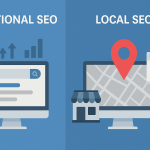If you’re a local business owner, showing up quickly in search results is essential. Whether you’re promoting a flash sale or sharing a local update, timing can make or break your visibility. But new content often takes days to appear on Google, costing you potential customers. That’s where rapid URL indexing for local SEO comes in—it speeds up the process, helping your pages get indexed in minutes. In this guide, we’ll walk you through how it works and how to use it to boost your local SEO.
What Are Rapid URL Indexing Tools?
It directly notifies search engines through APIs or submission protocols that new content is available for indexing. This process helps to significantly reduce the time required for search engines to discover and rank updated or newly published pages. Rapid URL indexing for local SEO is especially beneficial for local businesses that depend on real-time visibility, such as restaurants promoting limited-time offers, service providers advertising local deals, or businesses that rely on search engine rankings to drive foot traffic.
What to Look for in a Rapid URL Indexing Tool
The tool should allow you to submit URLs directly to search engines instead of just hoping bots will eventually find them.
API Integration
The best tools use Google’s Indexing API or Bing’s equivalents to notify search engines efficiently. This gives your site a much better shot at being crawled instantly.
Bulk URL Submission
Need to index a batch of pages? Look for a tool that supports bulk submissions. This is super helpful when you’re updating multiple service pages or adding new local landing pages.
CMS Compatibility
If your site is on WordPress, Wix, or another popular CMS, make sure the tool integrates easily. You want a setup that works with your site, not against it.
Indexing Reports
Visibility is power. The right tool should show you which URLs have been indexed and which haven’t. That way, you can make quick adjustments if needed.
Affordable and Safe
Rapid indexing should be safe and adhere to search engine guidelines. Avoid sketchy tools that promise overnight rankings—they can actually harm your SEO long-term.
Why Use Rapid URL Indexing for Local SEO
Now that you know what it is, let’s get into the reasons why you should make this a regular part of your local SEO strategy.
Immediate Visibility
If you’re running a weekend promo, launching a new location, or sharing a blog post tailored to a local event, you need that page visible as soon as possible. Rapid indexing ensures your content gets seen when it matters most.
Stay Ahead of Competitors
Let’s be honest—local SEO is a race. Every plumber, coffee shop, or boutique in your area is vying for those top search spots. If your content gets indexed first, you have a head start in ranking for those valuable local keywords.
Faster Results from SEO Efforts
You put in the work—optimizing pages, adding keywords, improving mobile usability. But without indexing, all that effort sits in the dark. Rapid indexing shines a spotlight on it right away.
Better Insights and Control
You’re not left wondering if Google has seen your page or not. Indexing tools often come with reports so you can know exactly what’s happening and adjust as needed.
How to Use Rapid URL Indexing for Local SEO
Let’s talk action steps. How can you integrate rapid indexing into your day-to-day SEO efforts without it feeling overwhelming? Here’s how:
Step 1: Identify Key Pages to Index Fast
Start with pages that directly impact local traffic. That includes:
-
Service pages (e.g., “Emergency Plumbing in Austin”)
-
Time-sensitive blog posts (“Top 5 Things to Do in Brooklyn This Weekend”)
-
Seasonal landing pages
-
Business updates (like changes in opening hours or new locations)
Step 2: Choose a Trusted Rapid Indexing Tool
Some popular options include:
-
IndexMeNow
-
Instant Indexing for Google (WordPress plugin)
-
URL Indexer.io
-
SpeedLinks
-
Bing URL Submission Plugin (for WordPress)
Make sure the one you choose supports your platform and offers features like reporting and API integration.
Step 3: Submit Your URLs
Depending on your tool, this might mean pasting in URLs manually, uploading a CSV, or letting the plugin automatically detect and submit updated pages. Some tools even allow you to set automation rules, like “submit every new blog post automatically.” That’s a time-saver.
Step 4: Monitor and Adjust
Don’t stop at submission. Check your indexing reports:
-
See which pages are indexed
-
Re-submit if necessary
-
Fix any indexing issues (e.g., duplicate content, poor page speed, missing metadata)
By staying on top of your indexing status, you’ll ensure nothing gets left behind.
Best Practices for Maximizing Your Results
For an optimized local SEO strategy, consider partnering with Wbcom Designs, who specialize in creating SEO-optimized websites that support rapid indexing integration. With their expertise in local SEO and website optimization, you can ensure your website is set up to rank faster, get indexed swiftly, and improve your local search visibility.
Optimize for Local Keywords
Use city, neighborhood, or ZIP code-specific keywords in your page titles, meta descriptions, and content. For example: “Affordable Dog Grooming in Santa Monica.”
Make Your Site Mobile-Friendly
Most local searches happen on phones. Google knows this—and rewards responsive, fast-loading sites.
Publish Consistently
Keep adding fresh, useful content with a local focus. New blog posts, event announcements, and local guides not only serve your audience—they also give you more URLs to index quickly.
Fix Technical SEO Issues
Make sure your pages load fast, use HTTPS, have proper schema markup (especially Local Business schema), and avoid broken links or errors.
Accelerate Your Local SEO Success
Let’s face it: in today’s fast-paced digital world, waiting around is not an option—especially when your business depends on local visibility.
Rapid URL indexing for local SEO is the shortcut that helps your content show up faster, giving you a crucial edge over competitors. Whether you’re a local coffee shop, salon, realtor, or repair service, getting your content indexed promptly can make the difference between being found today or lost in the noise.
If you’re serious about local SEO, it’s time to stop waiting and start indexing—rapidly.
Interesting Reads:
Tips To Sell Services on Website
What Are the Benefits of a Multi-Vendor Marketplace?
How to grow an online community from scratch?





